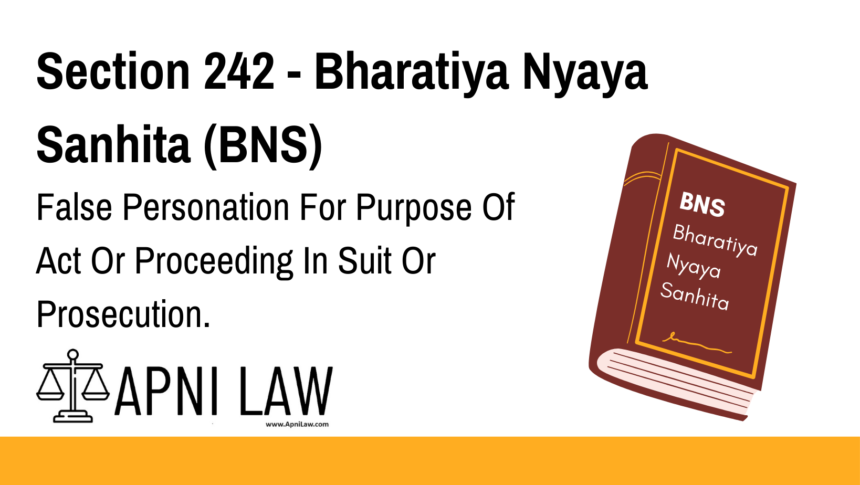Code: Section 242 BNS
Whoever falsely personates another, and in such assumed character makes
any admission or statement, or confesses judgment, or causes any process to be issued or
becomes bail or security, or does any other act in any suit or criminal prosecution, shall be
punished with imprisonment of either description for a term which may extend to three
years, or with fine, or with both.
Explanation of Section 242 BNS
Section 242 of the Bharatiya Nyaya Sanhita (BNS), 2023, penalizes individuals who impersonate someone else to manipulate legal proceedings. The act of false personation can be used to deceive courts, mislead authorities, or obstruct justice.
Key Elements of Section 242 BNS
- False Identity – The person intentionally impersonates someone else.
- Legal Proceedings – The impersonation occurs in a civil or criminal case.
- Manipulation of Legal System – Includes actions like giving false statements, confessing judgments, becoming bail/security, or issuing legal processes.
- Punishment –
- Up to 3 years imprisonment, or
- Fine, or
- Both.
Illustration
Example 1: Fake Bail Submission
A person pretends to be a relative of an accused and submits bail documents to secure release. This act falls under Section 242 BNS.
Example 2: Confessing Judgment in Another’s Name
A fraudster impersonates a property owner and confesses judgment in a court dispute, resulting in a legal disadvantage to the real owner. Such an act is punishable under Section 242 BNS.
Common Questions and Answers on Section 242 BNS
1. What is the primary objective of Section 242 BNS?
- To prevent fraudulent impersonation in legal proceedings and ensure that court actions are based on genuine identities.
2. Does this section apply only to criminal cases?
- No. It applies to both civil and criminal cases, including property disputes, contract issues, and criminal trials.
3. What are the punishments under Section 242 BNS?
- The guilty person may face:
- Up to three years imprisonment.
- A fine.
- Both imprisonment and fine.
4. Can someone be punished for using a fake identity online under this section?
- Only if the impersonation is used in legal proceedings. For example, if someone submits fake online evidence in court while pretending to be another person, they can be charged under Section 242 BNS.
5. What is the difference between identity fraud and false personation under this section?
- Identity fraud generally refers to financial deception (e.g., using someone’s identity for loans).
- False personation under Section 242 BNS specifically refers to misrepresentation in legal proceedings.
Conclusion
Section 242 BNS plays a critical role in ensuring fair legal proceedings by penalizing those who deceive courts through impersonation. The law acts as a deterrent against identity fraud in judicial matters.
For expert legal advice, visit ApniLaw today! 🚀











